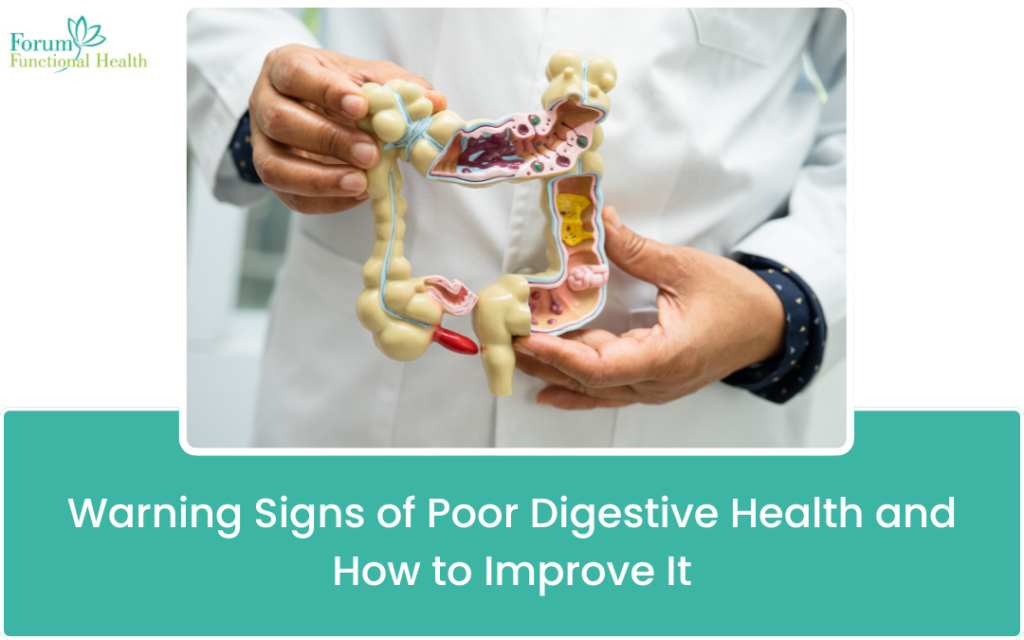Warning Signs of Poor Digestive Health and How to Improve It

Maintaining good digestive health is crucial for overall well-being. However, many people overlook the early warning signs of poor digestive health, leading to more serious health issues. In this blog post, we will explore the common symptoms indicating poor digestive health and provide tips on how to improve it. If you’re experiencing any of these signs, it’s important to seek professional help, such as the Forum Functional Health Center, a leading Functional Health Center in Texas, specializing in digestive health treatment.
Common Signs of Poor Digestive Health
1. Persistent Bloating
Bloating is a common digestive issue that can cause discomfort and a feeling of fullness. If you’re constantly experiencing bloating, it might indicate that your digestive system is not functioning properly.
2. Frequent Heartburn
Heartburn, or acid reflux, occurs when stomach acid backs up into the esophagus, causing a burning sensation. Chronic heartburn can damage the esophagus and requires attention.
3. Constipation
Having fewer than three bowel movements a week can be a sign of constipation. This can result from a lack of fiber in the diet, dehydration, or an underlying digestive disorder.
4. Diarrhea
Frequent loose, watery stools can be a sign of an infection, food intolerance, or an underlying digestive condition such as irritable bowel syndrome (IBS).
5. Stomach Pain and Cramps
Recurring stomach pain and cramps can indicate various digestive problems, including gastritis, ulcers, or inflammatory bowel disease (IBD).
6. Excessive Gas
While gas is a normal part of digestion, excessive gas can be a sign of food intolerances, infections, or digestive disorders.
7. Nausea and Vomiting
Feeling nauseous or vomiting frequently can be symptoms of digestive issues that need medical attention.
How to Improve Digestive Health
1. Eat a Balanced Diet
Incorporate a variety of fruits, vegetables, whole grains, and lean proteins into your diet. Foods high in fiber can help regulate bowel movements and prevent constipation.
2. Stay Hydrated
Drinking plenty of water aids digestion and helps to prevent constipation. Aim to drink at least eight glasses of water a day.
3. Exercise Regularly
Physical activity helps keep food moving through your digestive system, reducing the risk of constipation. Aim for at least 30 minutes of exercise most days of the week.
4. Manage Stress
Stress can negatively impact your digestive system. Practice stress-reducing techniques such as yoga, meditation, or deep breathing exercises.
5. Avoid Trigger Foods
Identify and avoid foods that trigger digestive issues. Common culprits include spicy foods, fatty foods, caffeine, and alcohol.
6. Get Professional Help
If you’re experiencing persistent digestive issues, seek help from a healthcare professional. The Forum Functional Health Center, a renowned Functional Health Center in McKinney, Texas, offers specialized Digestive Health Treatment in McKinney. Their experts can help diagnose and treat a variety of digestive disorders, providing personalized care to improve your digestive health.
Conclusion
Recognizing the warning signs of poor digestive health is essential for maintaining overall well-being. By adopting a healthy lifestyle and seeking professional help when needed, you can improve your digestive health and prevent more serious health issues. If you need expert advice and treatment, consider visiting the Forum Functional Health Center in McKinney, Texas, for comprehensive digestive health treatment.
Red More:- How Stress & Exercise Impact Gut Function for Optimal Digestive Health
